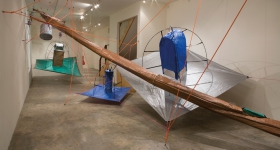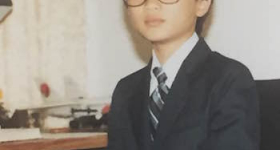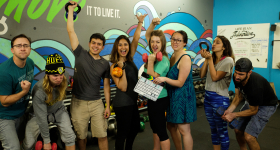Despite the fact that Emma Eun-Joo Choi was feeling under the weather during our interview, she blew me away with her energy, poise and wisdom.
The 22-year-old just landed her own short-form podcast on NPR, Everyone & Their Mom, which is being produced under the umbrella of the hit show, Wait Wait… Don’t Tell Me!
When she’s not at school, where she’s working on earning an undergraduate degree in English, or writing, editing and producing her latest show, or working on her creative writing and comedy writing, she eventually finds time to settle into being a 22-year-old — something she seems to have limited time for these days.
I had the pleasure of speaking with Emma, NPR’s first Gen Z podcast host, who also happens to be Korean. We spoke about the show, her hopes for the future, what it felt like to grow up as the only Asian kid amongst a sea of other white students and how those formative years influenced her future work.
This conversation has been edited for length and clarity.
-----------------------------------------
How did you get connected to NPR?
I started as an intern. I think for a lot of people you kind of grow up with it because your parents will put it on in the car. So, I kind of always grew up with it. I never considered myself a podcast person, but I’ve always considered myself a comedy person, and I loved the comedy in Wait Wait… [Don’t Tell Me]. I know a lot of my jokes sometimes end up on air for Wait Wait, but I also just want to make my coworkers and my friends laugh. I think that because I don’t have formal training in journalism, my voice is very different than a lot of people on NPR right now.
Thinking about the evolution of NPR in general, traditionally NPR has a type of demographic. There are some shows coming up through NPR that focus on differing points of view but not a ton necessarily, so I think it’s a credit to you that at 22 you’re spearheading a podcast at NPR but also that you’re a woman of color. I was hoping you could speak to your perception of the evolution of NPR’s content and the types of people hosting content and how you feel about this position, because it's a big deal.
I only joined NPR a year ago, so I don’t necessarily know a lot about their history with women of color, but I know that while I’ve been at NPR, I’ve been really impressed with their commitment to fostering new voices, new talent and new identities, and the kind of support that’s in place for people like me and BIPOC. But I think over the past few years I’ve realized exactly how hard it is to be a woman, especially a woman of color, in comedy. I didn’t expect comedy to be as brutal as it is. Things are changing a lot [in comedy], which is great, but, who determines what’s funny and what’s not is still held by a small group of white men. And I think that’s part of the reason why I feel so honored to host this show — because it would mean a lot to me if I had grown up with a Korean comedy person to look up to. I have Mindy Kaling, who is a wonderful Asian woman, but she was like the only one and I do very different comedy than she does.
It's been interesting to be really proud of being Korean and NPR allowing me to be as Korean as I am. It’s been both heartening to see their commitment to uplifting my voice but also disheartening to see how other platforms and organizations are not as dedicated as they seem to be or as I’d hope they’d be.
How did you get into comedy? Is that something you’ve always thought about?
I’m an English major and I focus on fiction writing. It’s weird because my fiction is very dark and serious and my comedy is very dumb. I guess I was always the goofball in my family. I’m the middle child so I think that has manifested itself in a way [where] I just love making my family laugh and doing really stupid things. But the first moment I actually realized comedy could be a job was when I read Mindy Kaling’s book, Is Everyone Hanging Out Without Me?, when I was in middle school and I realized that you can write jokes and stories that are funny and people will pay you money for it, which was really incredible. I just really wanted to do that forever, so I wrote plays and I did a comedy mag in high school and I used to find pirated videos of the Upright Citizens Brigade in New York doing improv and secretly watch them when I was supposed to go to sleep. Coming to college was the first place that I had an actual comedy community, so I got into comedy that way.
But comedy has been really important. Because I grew up surrounded by white people in Northern Virginia and one of my greatest insecurities was how people see me, [I wanted to be] able to control that narrative in a really fun way. If you make someone laugh, everyone’s happy, but you can control your narrative a little bit that way.
Can you talk about any other influences or people you aspire to be like who have really informed your writing and comedy?
It changes every week or so, but I love Mindy Kaling. Growing up I used to do this thing where I’d look up Tiny Fey or Amy Poehler and look up their past and create a kind of life plan for myself, which obviously isn’t the way life worked, but I really loved those really smart women who were also making really goofy comedy. I love 30 Rock because it’s so dumb but so smart at the same time. This show has been really exciting because comedy has really changed, and it’s really contextual, dense, high-energy comedy. There’s been a huge wave: Chris Fleming, Julio Torres and Ali Wong are doing really cool new work. Watching standup specials, going to comedy places in Brooklyn and seeing these standups perform — it’s been really inspiring to see people my age doing cool new stuff.
What are your aspirations for your career? What do you envision this show becoming and what would you like this show to encompass? What kind of topics do you have in mind?
We tape so much stuff that I love that doesn’t make it into the 15-minute cut; my dream is to see the show expand to be a long-form, really fun variety show. NPR does such a good job of curating the Tiny Desk [Concerts] and the music scene, and it’s become a really cool voice in that sphere. I think we could do the same thing for comedy and be a space where we showcase new talent and where people go.
In terms of me and long-term stuff: I guess I am young but I also feel super old because I never imagined being 22 before, which is a weird thing. But when I look ahead, I just know I want to keep performing, but I also want to publish my novels and my books and find a way to do both. I used to think I wanted to be a writer on SNL, then I thought I wanted to be like Mindy Kaling and make my own shows, but I think I just want to find some kind of balance where I can pursue both, and I’m not sure what that looks like yet.
Thinking about the responsibility it entails to be a woman of color in comedy — how does that feel? Do you feel pressure in some areas? How do you feel knowing there are so many firsts happening with your show?
It’s interesting because before we launched, everyone kept telling me that I was about to get a lot of attention, but no one could tell me what that meant because they didn’t know. I’m friends with Jack Corbett who’s the Planet Money talk guy [NPR host] and we’re two NPR Gen Z hosts. He said everyone will try to give you advice, but there’s no way you can prepare yourself for what it feels like to be an NPR host and also in your early 20s.
First reaction I had is that I was overwhelmed because there’s no way to prepare yourself when there’s no precedent. The other part is that I feel all of the above. I feel really excited to be Korean and a woman of color and let that be whatever I want it to be. I realized over the past week that there could be people listening to this show and realizing they could do comedy, which is something I haven’t really wrapped my head around yet. And at the same time there is pressure with it too. There’s a pressure of wanting to prove it’s an experiment that’s successful, that it’s an experiment NPR was justified in taking because it was a big risk, and NPR had never hired a college student before. I want to prove I was worth it. There’s a lot of questioning about, “Is this going to work?” not only by NPR but other people [too]. I’ve had some pretty negative experiences with white men [in] comedy, especially here at school, that part of me wants to just stick it to them and be like, of course women are funny. You can be a woman of color and do comedy and not ever have to sleep with anyone to get there or anything like that, which is dark, but …
Was there ever a point at which you thought, being only 22, that maybe this wasn’t a great idea? Or did you just run with it?
I just kind of took it because I love this job so much. The way I started is that they had a different host for the first pilot and I did the credits. They liked the credits so much, they had me as a cohost, and after that they had me as a host and the whole time they were like, “Emma, we don’t think we can hire you. This is for fun.” And I was like, cool. So, when they actually offered it to me, I was like, yes please, I would love to do this because it is a lot of fun. But I think my producers and the team at Wait Wait… have been really great because they have been very protective of my time and have been open and honest. [They’ve] been like, “Emma, you know if you take this job you can’t just go camping with your friends. This is a real job, and in some ways your college experience is kind of ending because you’re working.” That was a really big decision to make when it was like, OK, I’ve done college and now it’s time to try something new and step into a new part of my life. It was kind of the first big adult decision I’ve ever had to make, and I think I’m still grappling with what that means for my life. So, it’s been an interesting transition.
I’ve always been an intern before and I’ve always been kind of the youngest person in the room, which I still am, so it was really strange to think, oh, people not only want to hear what I think, but what I think has weight. I am the host and I can say things not just as an intern.
What do you see as the biggest challenges in this role?
There are a lot of challenges. I think top of mind is just time management. My team has been really understanding because they know I’m also a full time student, but it’s been really difficult because I’ll have a three-hour workshop and then I’ll come home to tape something and then I have to do a piece set and then I have to go to a different thing. Trying to find balance between school, hosting an NPR show and also finding a way to be 22 and enjoying that a little bit has been really challenging. I’m very tired these days.
When everyone talks about a woman having it all — I can’t even imagine being pregnant and having a family. So I’m just trying to have it all on a very minor level right now.
It’s been weird.
Can you describe what it was like for you growing up in Virginia and, for better or for worse, describe some of the negative and positive things that came out of that experience and later informed the art that you create?
I’ve spent a lot of time thinking about this. Northern Virginia is a really weird place because there are pockets of it that are incredibly diverse. Like, Annandale is basically all Korean. My grandparents have lived in northern Virginia for like 40 years, and they never had to learn English because they lived in a Korean community. But for some reason the spaces I found myself in, I was like the only Asian friend. I went back in my yearbooks the other day and there’s some really racist stuff. Someone calling me “Chinese Takeout” and someone else saying “You’re my favorite Asian person.” And I’m like, oh, that wasn’t okay.
I was in middle school and high school right before people started being PC or being race conscious, and I spent all of my life until college just trying really hard to be white. Not consciously, but I knew there was something different about me, and that part of me was not something to hold up but something to kind of overcome. Especially in terms of boys and stuff. Because no matter how pretty you are, a white girl’s always going to get one step ahead of you. So that was always really hard. The Korean part of me is a part of me that I always kind of kept on the DL. I stopped speaking Korean with my mom, and there was a time I was being weird about my grandparents and not telling people my Korean name. So, I guess that was the negative of growing up in Northern Virginia. The spaces were just really white and really suburban and my high school wasn’t really a place where artistic expression ran free. I was kind of the only person doing what I was doing too.
But on the other hand, I’m incredibly close with my family and my family has always been incredibly supportive. They’ve never been tiger parents saying, “You can’t do art.” One of my old directors once told me, “I love your parents, Emma, because they don’t understand what you’re doing but they love it.”
Coming to college and embracing every part of myself for the first time and having my family still stand behind me has been a really interesting way to reflect on the way I grew up. When I look at myself when I was 15, I was a completely different person than at 22.
Anything else you’d like to add? Sound bite or elevator pitch of why someone should watch your show?
I guess I would say that comedy should be fun. When you’re making comedy or when you’re really involved with anything, I think it can stop being fun, but I think this show is a good way to really just have fun and let yourself go to all those wild places that your brain takes you, down a rabbit hole into all the fun and wonderful things that are happening in the world, even when everything looks pretty terrible. Just take 15 minutes and have fun with some friends. I think that’s a nice way to refresh.
You can catch Everyone & Their Mom via NPR podcasts, with new episodes out every Wednesday.









Comments